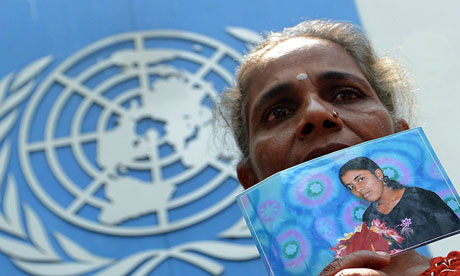A Brief Colonial History Of Ceylon(SriLanka)
Sri Lanka: One Island Two Nations
A Brief Colonial History Of Ceylon(SriLanka)
Sri Lanka: One Island Two Nations
(Full Story)
Search This Blog
Back to 500BC.
==========================
Thiranjala Weerasinghe sj.- One Island Two Nations
?????????????????????????????????????????????????Friday, September 30, 2016
Office Of Missing Persons Sri Lanka: Deceptive & Futile

By Thambu Kanagasabai –September 30, 2016
The Office of the Missing Persons [OMP]
expected to function shortly has been welcomed as a positive step from
various quarters towards reconciliation after the war. However, a close
scrutiny and analysis of the legislation governing it reveals the
deception and futility underlying most of the provisions in The Act.
Sri Lanka ranks second in the list of countries after Iraq to record the
largest number of disappearances with unofficial estimated numbers of
about 90,000 since 1980s. Out of these disappearances, enforced or
involuntary disappearances are reported to be around 65,000.
Enforced Disappearances always involve state officials and/or security
forces. They happen when a person is illegally arrested and detained in
undisclosed centres where torture and other ill-treatment including
killing and disposal of the dead takes place. The arrest and detention
is carried out violating all rules and procedures including court
process.
The UN Working Group on Enforced or Involuntary Disappearances, [WGEID
c/oOHCHR] in its report on July 08, 2016 after staying in Sri Lanka from
09 – 18 November 2015, has plainly made the following damning
statement: “Enforced disappearances have been used in a massive and
systematic way in Sri Lanka for many decades to suppress political
dissent, counter-terrorism activities or in internal conflicts and many
enforced disappearances could be considered as war crimes or crimes
against humanity if addressed in a court of law.” The UN working Group
received 12,000 cases of enforced disappearance related to Janatha
Vimukkti Perumuna [JVP] uprisings and during the armed conflict between
Liberation Tigers of Tamil Eelam [LTTE} and the Sri Lankan government
forces from 1980 to 2010.
Missing Persons include those who are arrested, or surrendered or
summoned for inquiry and detained by the security forces during the war.
These persons finally suffer disappearances mostly by killing and are
generally untraceable. About 19,000 persons were reported to the
Paranagama Commission as confirmed missing.
The Sri Lanka parliament passed the Office of the Mission Persons Act
No. 14 of 2016, coming into effect from 26th August 2016, the government
introducing the Bill in accordance with an undertaking given under the
UNHRC resolution of October 01, 2015.
Due to international pressure and United Nations concerns over the
hither to unresolved cases of enforced disappearances and missing
persons, the Office of the Missing Persons Bill was passed in undue
haste, ignoring the protests and concerns of affected parties who
demanded prior consultation and consideration of their input as called
for in the UNHRC Resolution in October 2015.



